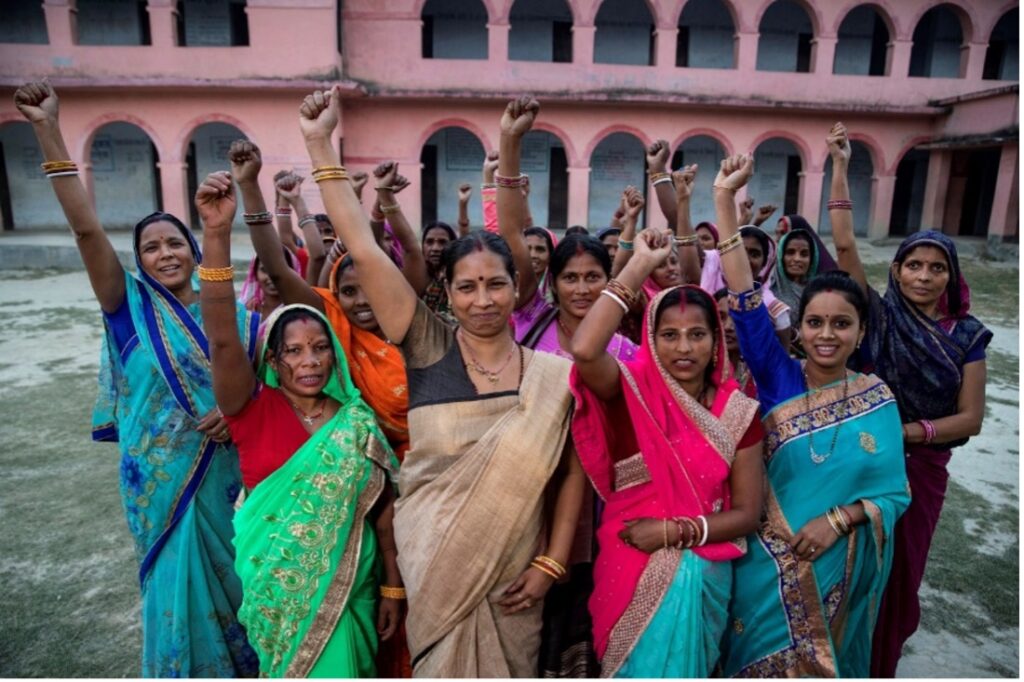
photo credit: Paula Bronstein/Getty Images/Images of Empowerment
Civil and political freedoms (e.g., democratic institutions) theoretically possess the potential to reduce inequality by empowering marginalized groups and fostering inclusive policies.
That said, the relationship is complex, and factors such as race, gender, and socioeconomic status can hinder access to civil and political participation.
Furthermore, political processes, even within countries with free and fair elections, can be susceptible to manipulation or fragmentation, leading to outcomes that perpetuate inequality.
Despite these challenges, the relationship between civil and political freedoms and equality remains compelling, as genuine and robust free institutions have the potential to serve as catalysts for addressing systemic disparities, promoting social justice, and empowering marginalized communities. In theory, civil and political freedoms can ensure equal representation, prioritize equitable distribution of resources, and build a fairer society.
Against this backdrop, we explored the relationship between freedom and inequality, hypothesizing that the more civil and political freedoms found within a country, the lower the country’s income inequality.
Is there consensus among experts?
Academic literature on the relationship between inequality and civil and political freedoms is disparate and illustrates a lack of consensus among researchers.
One older but relevant study (Muller 1988) argues that the time existing as a democracy (i.e., maturity) is the key element to decreasing inequality (i.e., a positive correlation between equality and longevity of political freedoms)[1]. The analysis posits that the causal link of democracy on income equality operates through intervening mechanisms such as interest groups and political parties, and thus the impact of democracy on income equality happens gradually. The author further posits that only as poorer members of society organize unions and interest groups to develop an electoral base, political freedoms become associated with a reduction in inequality.
Other relevant research (e.g., Knutsen 2015) explores the two-way causal relationship between these variables, including the reversal causal mechanism of how elevated levels of inequality may work to destabilize democracies[2]. This study concludes that there is no robust effect of income inequality on the existence of democracy, nor on the level of democracy present, nor on the rate of democratization probability or democratic stability. The study does however conclude that democracy seems to reduce income inequality when the latter is proxied by the share of income going to wages as opposed to passive income.
A World Bank study (Gradstein & Milanovic 2000)[3] contradicts these analyses and more broadly argues against the common assertion that greater political freedoms tend to result in more equal societies. The paper argues that the relationship is complex, highlighting Eastern Europe as an illustration of the opposite trend, whereby income inequality seemed to increase post democratization of this bloc of countries.
Freedom Score
The Freedom House Freedom Score Index[4] uses a two-tiered system consisting of freedom scores (0-100) and freedom status (Not Free, Partly Free, Free). The Freedom Score [5] is calculated through a weighted combination of 10 political rights and 15 civil liberties indicators and grouped into subcategories (e.g., Electoral Process, Political Pluralism and Participation, and Functioning of Government; Freedom of Expression and Belief, Associational and Organizational Rights, Rule of Law, and Personal Autonomy and Individual Rights). Based on the scoring of these indicators, a weighted calculation is employed to determine the Freedom Status of a given country.
Figure 1: Freedom House, Freedom status calculation
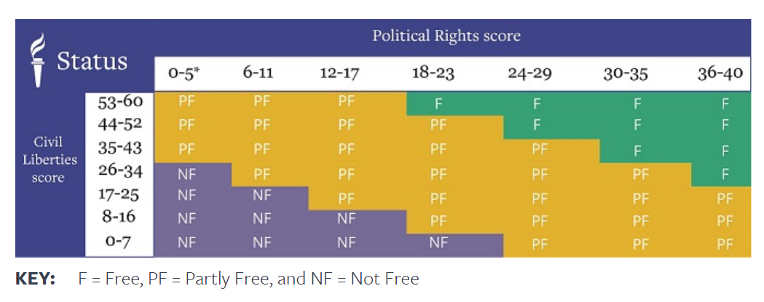
GINI Index
The GINI Index, based on primary household survey data obtained from government statistical agencies and World Bank country departments, is a measure of income inequality that summarizes the dispersion of income across the entire income distribution[6]. The closer the index is to zero the more equal the distribution of income, while the closer the index is to one the more unequal the distribution of income.

Analysis: The relationship is tenuous, but strong among “free” countries
Overall, we found a weak correlation between the Freedom Score and the GINI Index across the globe (Figure 3; – the number .01 refers to the correlation coefficient for that specific analysis). However, as depicted in Figure 4, the Freedom Score and GINI Index were much more strongly correlated when limiting this analysis to countries designated as “Free” by Freedom House (R= – 0.55). Figure 5 illustrates this trend using the list of countries with the top ten freedom scores, and their (low and decreasing) levels of income inequality.
As the countries with the highest freedom scores tended to be European countries, we also ran the analysis separately for European and Non-European countries, finding that freedom and income inequality remained correlated when segmenting by these two geographies. This suggests that this relationship, among free countries, persists across geographic regions.
Discussion: What might be driving this dynamic?
While additional analysis is needed to identify the underlying components of the link between civil and political freedoms and equality, the strong correlation within ‘free’ countries may suggest that a certain threshold of civil and political freedoms (high freedom score; e.g., strong democratic institutions) is required to create top-level income equality.
For countries within ‘partly free’ and ‘not free’ categories, varying political systems and civil and political structures show varying levels of success in developing income equality. In some countries, the lack of civil and political freedoms (i.e. more government control) might actually lead to more equitable societies in the short- and medium term, particularly in countries seeing rapid economic development (e.g.: China).
That said, at some point the advantages of tighter government control and lower civil and political freedoms on combatting inequality and producing a more equitable society may crest, and more civil and political freedoms are needed. Systems which curtail civil and political freedoms may limit their ability to create top-level income equality.
A final reflection on addressing rising global inequality
Our analysis focused on examining the relationship between civil and political freedoms and inequality at a high level. Further research on the intervening mechanisms between freedom and inequality is needed to explore which specific political and civil liberties are most linked to reduced income inequality. Specifically, further analysis should be conducted to identify the underlying social and political elements (e.g., freedom of press, voting rights, social expenditures, space for civil society, timing) that likely lead to decreased inequality.
The link between these two topics addresses pressing issues related to democracy, human rights, and a better and more equitable future. Exploring this relationship is timely and critical, as inequality is a key global concern and continues to rise among 70 percent of the world’s population [6]. (United Nations 2020). Furthermore, the growth in inequality comes at a time when the globe is seeing a backsliding in social and political freedoms. Done effectively, building the case for civil and political freedoms as a catalyst for economic equality may be a powerful tool to combat these current global challenges.
Appendix
Figure 3: Freedom score versus GINI index globally

Figure 4: Freedom score versus GINI index across free countries
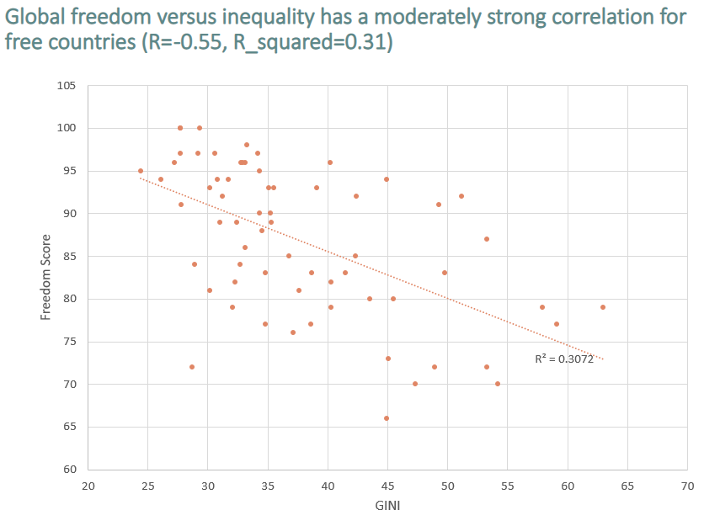
Figure 5: Countries with top 10 freedom scores and GINI index
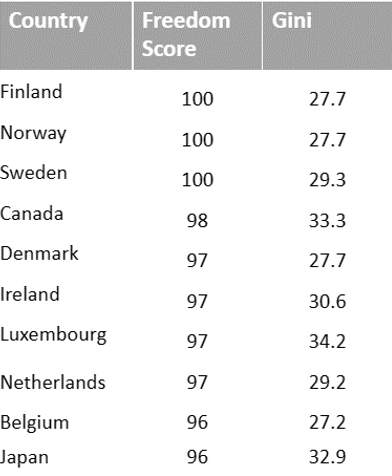
Figure 6: GINI index versus social expenditure for OECD Countries
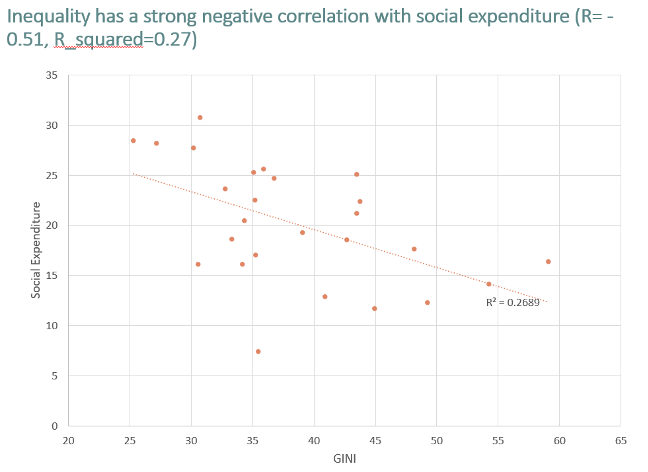
Citations
[1] Edward N. Muller, Democracy, Economic Development, and Income Inequality on JSTOR[2] Reinvestigating the Reciprocal Relationship between Democracy and Income Inequality, by Carl Henrik Knutsen
[3] Source: Does Liberte =Egalite? A Survey of the Empirical Links between Democracy and Inequality with Some Evidence on the Transition Economics
[4] https://freedomhouse.org/reports/freedom-world/freedom-world-research-methodology
[5] https://data.worldbank.org/indicator/SI.POV.GINI?most_recent_value_desc=true [6] Rising inequality affecting more than two-thirds of the globe, but it’s not inevitable: new UN report | UN NewsBrent McCann brings international humanitarian, research, and investment experience to help clients navigate strategic decisions and maximize their impact through evidenced-based quantitative and qualitative analyses. Prior to Camber, he worked for the Arab Reform Initiative researching anti-corruption and migration-related topics in the Middle East and North Africa, as well as designing institutional and project-specific monitoring and evaluation tools. Brent began his career in the nonprofit sector. He cofounded the Liliir Education Project and has 8+ years working on education, public policy, economic empowerment, refugee rights, and conflict resolution projects in South Sudan and greater East Africa. Brent holds an MA in Human Rights and Humanitarian Action from the Paris School of International Affairs (PSIA) at Sciences Po, and obtained his B.B.A. with honors in International Business and Entrepreneurial Leadership from Gonzaga University. A Seattle native, Brent enjoys scuba diving, playing basketball, backpacking, skiing, and spending time with friends and family.
Melissa Flores leverages her background in quantitative analysis and research to support clients’ strategic decision-making centered around social impact. Prior to Camber, Melissa worked as consultant at the UN World Food Programme, providing operational and programmatic support to the organization’s global food security monitoring initiative. Melissa began her career as a financial consultant, working on risk mitigation strategies for Consumer and Healthcare clients in the United States. She holds an M.A. in International Development from Sciences Po’s Paris School of International Affairs and a B.A. in Applied Mathematics from Harvard University.
